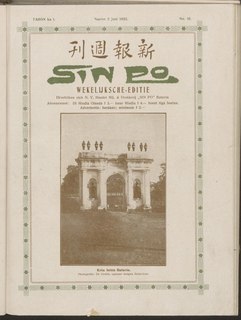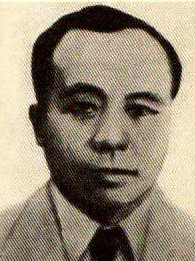
Nio Joe Lan was a Chinese-Indonesian writer, journalist, and history teacher.

Kwee Hing Tjiat was a Chinese-Malay journalist and a leading peranakan Chinese intellectual of the late colonial era.

Sin Po was a Peranakan Chinese Malay-language newspaper published in the Dutch East Indies and later Indonesia. It expressed the viewpoint of Chinese nationalism and defended the interests of Chinese Indonesians and was for several decades one of the most widely read Malay newspapers in the Indies. It existed under various names until 1965.

Djawa Tengah was a major Malay-language peranakan Chinese daily newspaper in Semarang, Dutch East Indies from 1909 to 1938. It is said to have been the first Chinese newspaper in Semarang.

Tjhoen Tjhioe was a Malay language Peranakan Chinese newspaper from Surabaya, Dutch East Indies catering mainly to the Chinese population. The full title of the paper was Tjhoen Tjhioe: Soerat kabar dagang bahasa Melajoe jang moeat roepa kabar penting bagi bangsa Tionghoa. Although the paper only existed for a short time, during that time it was recognized as one of the top Chinese newspapers in the Indies, alongside Sin Po and Perniagaan.
Sie Hian Ling, who sometimes signed his works H.L. Sie, was a Peranakan Chinese journalist from Semarang, Dutch East Indies. He was one of the first Chinese journalists in the Indies and an early translator of Chinese novels.

Ang Jan Goan was an Indonesian Chinese journalist, publisher and political thinker, and director of the influential newspaper Sin Po from 1925 to 1959.
Tjan Tjoe Som was an Indonesian Chinese intellectual and sinologist at the University of Indonesia.

Tjoe Boe San was a Chinese nationalist, translator and newspaper editor in the Dutch East Indies, most notably editor and director of the influential Indonesian Chinese newspaper Sin Po until his death in 1925. Along with Kwee Kek Beng, he was a key member of the "Sin Po Group" which was a political faction of the Indonesian Chinese which believed that they should stay out of Dutch colonial politics and remain focused on China.
Perniagaan was a Malay language Peranakan Chinese newspaper in Batavia, Dutch East Indies from 1907 to 1930. The newspaper was the conservative rival of Sin Po and was closely associated with the Tiong Hoa Hwee Koan and the Chinese Officer system.
Keng Po was a Malay language Peranakan Chinese newspaper published in Batavia, Dutch East Indies from 1923 to 1958. During most of that time it was the second-most popular Malay-language Chinese newspaper in the Indies after Sin Po. It was also an important paper in the early period of Indonesian independence in the 1950s.
Warna Warta was a Malay language Peranakan Chinese newspaper published in Semarang, Dutch East Indies from 1902 to 1933. Alongside its more popular rival Djawa Tengah, it was highly influential among the Chinese Indonesian population of Semarang during this time.
Kwee Kek Beng was a Chinese Indonesian journalist and writer, best known for being editor-in-chief of the popular Malay language newspaper Sin Po from 1925 to 1947.

Hauw Tek Kong (1887-1928) was a Peranakan Chinese newspaper editor and publisher from the Dutch East Indies associated with Sin Po and later Keng Po.
Yoe Sin Gie (1880-1957), sometimes spelled Joe Sin Gie, was a Peranakan Chinese businessman and newspaper owner largely remembered for being one of the co-founders and first director of Sin Po, one of the most popular Chinese Indonesian newspapers of the Dutch East Indies.

Njonja Tjoa Hin Hoei, who was born Kwee Yat Nio and was also known by the Buddhist name Visakha Gunadharma, was a Chinese Indonesian journalist, writer, Buddhist figure, and political activist during the late colonial and early independence periods. She was especially known for being publisher and editor of a women's magazine Maandblad Istri which ran from the 1930s to the early 1950s.

Nyonya The Tiang Ek, whose real name was Lie Djien Nio, was a Chinese Indonesian journalist, writer, and translator who was active in the late colonial period in the Dutch East Indies. She was part of a small cohort of Chinese Indonesian women novelists and short story writers publishing during that time which included Khoe Trima Nio, Tan Lam Nio and Yang Lioe. She was known for translating detective and cloak-and-dagger stories and was interested in women's liberation and increased freedom for Chinese Indonesian women in particular. She was one of only a handful of documented Chinese Indonesian women translators in the Indies.

Nona Tan Tjeng Nio was a Peranakan Malay language poet active in the 1890s. She was one of the earliest known Chinese Indonesian women writers to be published in the Indies; her poems are considered to have surprisingly modern themes and ideas for their time.

Phoa Tjoen Hoat, who also published under the name Th. H. Phoa Sr., was a Chinese Indonesian, Malay language journalist, translator and newspaper editor active in the Dutch East Indies in the early twentieth century.

Phoa Tjoen Hoay, who sometimes published as T. H. Phoa Jr., was a Chinese Indonesian, Malay language journalist, translator, and newspaper editor active in the Dutch East Indies in the early twentieth century. He translated a number of Chinese and European works into Malay, including seven volumes of Sherlock Holmes by Arthur Conan Doyle.












